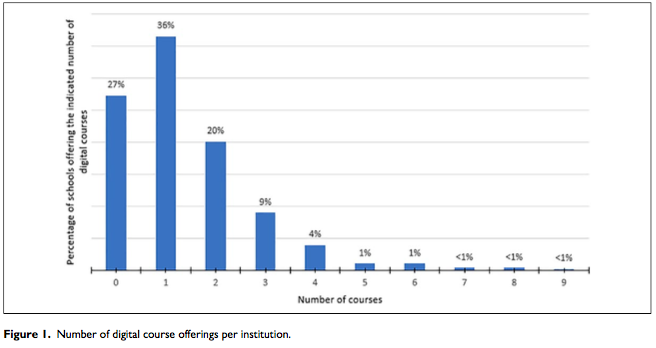
In a 2019 article featured in the Journal of Marketing Education, Langan et al. examine the state of social media and digital marketing curriculum in all 529 domestic AACSB undergraduate marketing programs. Their findings are quite mind-boggling. Even though digital disruption is almost two decades old now (Facebook launched on February 4, 2004 as a benchmark), there is a dearth in standardized academic curriculum that specializes in a comprehensive educational program at most universities. In fact, this study finds that 254 universities (53%) of all universities either don’t offer a single digital marketing class (27%) interweaving digital examples into other courses or only offer one class in a varied range of possible classes that are not required for the marketing major (36%). Even more astounding, the list of classes (Appendix B) that these researchers included as a potential class covers more than 229 unique digital marketing course titles, speaking to even less consistency than what you might expect of at least a single course offering.
The results also indicate only 106 universities (20%) of these schools offer two courses. Furthermore, 54 schools (11%) choose to offer a specialization but no digital marketing requirement for all students, 38 schools (8%) require a digital marketing class but no specialization, and only 9 universities (1.9%) offer a specialization and require a digital marketing class of all students. Now stop for a minute and let that sink in. This means that in a world where digital marketing has revolutionized how companies communicate and do business, less than 10% of U.S. universities require a digital marketing class of all of their marketing students.

When you combine this with a recent survey of nearly 1,000 marketers in U.S. and U.K. companies where 8% of the respondents were able to demonstrate entry-level digital marketing skills (O’Brien 2016), there perceives to be a huge gap between what skills academia is providing to their students and the skills needed to be proficient in our current digital marketplace. These results suggest that if universities don’t realize the inadequacy of their current marketing curriculum, then major corporations may make having a college degree irrelevant, lowering the value of having a college degree. In fact, some might argue that we are already there. See Glassdoor’s 2018 blogpost entitled, “15 More Companies That No Longer Require a Degree – Apply Now.” Notable companies on that list include Google, Apple, IBM, and Bank of America, all with jobs in the area of marketing communications or in the customer/user experience.
While this picture currently seems to be bleak, the authors did find that over the past 5-6 years (beginning in 2013), that universities have begun to elevate their courses from elective to required, suggesting that if the trend continues, academia should expect to see an increase of digital marketing courses into core requirements for marketing majors. However, we would argue that this trend is often constrained by the ability and confidence that current marketing professors have in their own digital abilities. Because most professors are not practitioners, their own skills are greatly limited in the area.
We would argue that this occurrence leads many universities to two options. Either hire adjunct or clinical professors that work in the digital arena or provide more theoretical-laden classes with minimal practical skill-building opportunities. Through our own research here at The Social Media Magnet, we have found these phenomena to be true about professors who teach social media or digital marketing:
- They dislike teaching out of textbooks because they go out of date so quickly. Real-world examples are stale and old, and there is even a dearth of theory as to why certain trends are occurring.
- Professors who have taught in this area for more than five years don’t use textbooks. They cobble together their own resources from many different sources, leading to increased costs for students across different platforms, simulations, or journal articles.
- Any desire to add practical applications to the class often becomes a time-burden for the professor as he/she has to “carry the student across the threshold.” They often turn to group projects which may or may not be fruitful depending on the client response.
- Unlike simulations, grading for these client student projects becomes difficult and very subjective. Again, depending on the client feedback, which may or may not be extensive, provides difficulty in standardizing grading rubrics.
For many of these reasons, we set out to create a social media curriculum that could reduce these pain points for professors. Through years of trial and innovation, we have created a courseware and practicum that teaches students practical digital marketing skills through the use of class practicum that allows them to completely be creative and analytical. We teach students the fundamental principles of an inbound marketing strategy that employers are raving about. Students get to learn the theory and practical skills in an academic setting that becomes easy for a professor to manage. We take the “carrying across the threshold” and reduce it a handhold. We provide the text, assignments, project grading, instructor’s resources, course certification, all the things you need to make the student experience one that they will never forget.
If you are a college professor and are just becoming familiar with what we do at The Social Media Magnet, check our professor overview with highlights of our features and benefits. If you are interested in considering The Social Media Magnet for your university, we have a professor preview function that will allow you to see and work with some of the content. If you are already in preview, which many of you are, and you are ready to commit to using our curriculum in your next semester’s class, then fill out our Commitment Form to get on-boarded and prepped for your next class. Or if you just have some general questions, feel free to contact us. We would love to assist you however possible.
References:
Langan, R., S. Cowley, & C. Nguyen (2019). The State of Digital Marketing in Academia: An Examination of Marketing Curriculum’s Response to Digital Disruption. Journal of Marketing Education, 41(1), 32-46. Link to the article: https://journals.sagepub.com/doi/abs/10.1177/0273475318823849?journalCode=jmda
O’Brien, C. (2016). Missing the mark: The digital marketing skills gap in the USA, UK, & Ireland. Last retrieved from https://digital marketinginstitute.com/en-us/the-insider/missing-the-mark-the-digital-marketing-skills-gap-in-the-usa-uk-ireland on April 1, 2019.
Glassdoor. (2018). 15 more companies that no longer require a degree – Apply now. Last retrieved from https://www.glassdoor.com/blog/no-degree-required on April 1, 2019.
